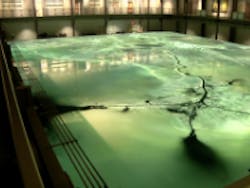WaterWorld Weekly Newscast, April 23, 2018
The following is a transcript of the WaterWorld Weekly Newscast for April 23, 2018.
Hi, I'm Angela Godwin for WaterWorld magazine, bringing you water and wastewater news headlines for the week of April 23. Coming up...
'Blending' is focus of new EPA rulemaking effort
MIT develops graphene manufacturing process
Major upgrade planned for San Fran biosolids facility
Massive river model helps fight erosion
The EPA announced last week that it will be reaching out to states, local communities, and stakeholders as it begins a new rulemaking process to provide certainty surrounding the use of “blending” by wastewater treatment plants.
Blending happens when wet weather flow is routed around secondary treatment and is then merged with the treated effluent for disinfection prior to discharge so that the excess influent does not overwhelm the treatment plant.
EPA said it aims to provide regulatory clarity around the practice "so that facilities can optimize wastewater treatment during wet weather."
The agency said it will be reaching out to stakeholders to gather input during the coming months.
Graphene has been the subject of much interest and excitement in the water industry, as many believe the "supermaterial" could revolutionize water treatment.
It's particularly suited for use in filtration membranes but it's only been produced in small batches.
Now MIT engineers have developed an industrial, scalable way to manufacture graphene tailored for use in membranes, opening the door to commercialization.
The process uses a roll-to-roll method, sort of like a printing press, that uses heat and chemical vapor deposition to "grow" graphene on copper foil.
The engineers were able to produce 10 meters of continuous graphene in their longest run -- nearly four hours.
Tests demonstrated that the performance of the continuously produced graphene was comparable to small-batch, lab-produced graphene.
More information about their study can be found in the journal Applied Materials and Interfaces.
Last week, the San Francisco Public Utilities Commission announced the approval of a $1.3 billion upgrade to its Southeast Treatment Plant, the city's largest wastewater facility.
As part of the upgrade, the plant -- which was built in 1952 -- will see a number of much needed improvements, including new biosolids digesters, a new headworks facility, and odor control improvements.
The facility will also use 100% of its biogas to generate heat and power to support the plant.
Construction is anticipated to start at the end of this year and will be financed through a $625 million low-interest loan from EPA's WIFIA program.
Scientists are using a $4 million model replica of the lower Mississippi River to help fight coastal land loss in Louisiana. AP's Stacey Plaisance has more.
For WaterWorld magazine, I'm Angela Godwin. Thanks for watching.
